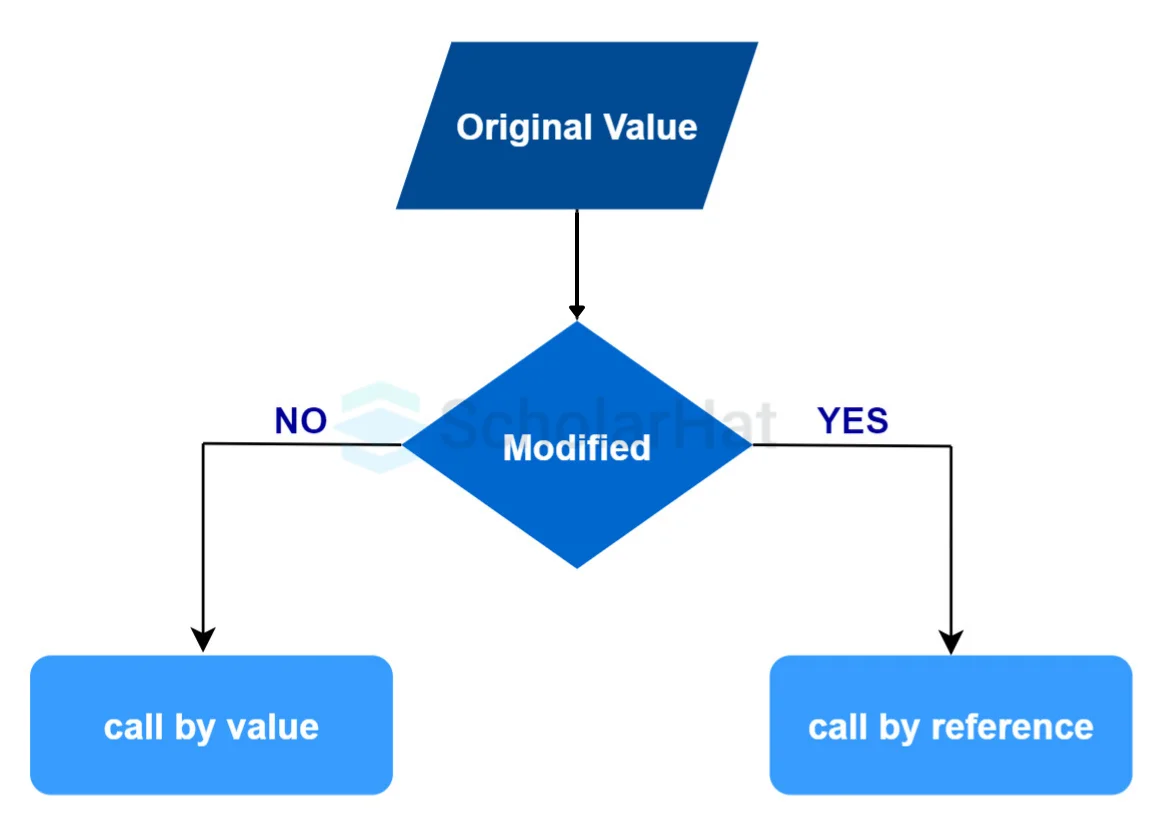12
DecCall by Value and Call by Reference in C
Call by Value and Call by Reference in C: An Overview
Call by Value and Call by Reference in C are the ways to pass arguments to the functions in a programming language. In this C tutorial, we will be looking at call by value and call by reference. Our C Programming Language Online Course Free resources will also help you gain hands-on experience and practical knowledge. After reading this article, not only you will have a good understanding of both techniques but also feel confident enough to apply them wherever necessary.
Call by Value and Call by Reference in C
We have already seen functions and their various aspects like formal parameters and actual parameters in the section, Functions in C. In the function call, we used to pass parameters/arguments/data to the function that is being called.
In this section, we will look at the two ways in which parameters are passed in the function call in the C language.

1. Call by Value in C
In this method, the value of the actual parameter is passed to the corresponding formal parameter of the called function. This technique ensures that the original data i.e. actual parameter does not get altered by the called function, as the called function deals only with a copy of that data.
When a programmer opts for the call by value, the memory space for the formal parameters is allocated separately in the function stack, which further reinforces the fact that the original data remains untouched. Thus, formal parameters and actual parameters are allocated to different memory locations.
Example of Call by Value in C
#include <stdio.h>
void swap(int x, int y) {
int temp = x;
x = y;
y = temp;
}
int main() {
int a = 40, b = 50;
printf("Before swap, a = %d and b = %d\n", a, b);
swap(a, b);
printf("After swap, a = %d and b = %d\n", a, b);
return 0;
}The above program in the C Compilerswaps the values of the variables, a and b. In the main() function, the function call passes the actual parameter values i.e. values of a and b to the swap() function. The swap() function swaps the values of a and b.
Due to the call-by-value method, the value of original variables a and b remains unchanged even after swapping by the swap() function.
Output
Before swap, a = 40 and b = 50
After swap, a = 40 and b = 50Read More - Top 50 Mostly Asked C Interview Questions
2. Call by Reference in C
In this method, instead of passing the values of the actual parameters to the formal ones, the addresses of the actual parameters are passed. Therefore, the modification by the called function to the formal parameters affects the actual parameters as well.
When a programmer opts for the call by reference, the memory space for the formal parameters and the actual parameters are the same. All the operations in the function are performed on the value stored at the address of the actual parameters, and the modified value gets stored at the same address.
This technique not only conserves memory but also simplifies collaboration, as complex data types like arrays or structures can easily be manipulated without being duplicated needlessly.
Example of Call by Reference in C
#include <stdio.h>
void swap(int *a, int *b) {
int temp = *a;
*a = *b;
*b = temp;
}
int main() {
int x = 5;
int y = 10;
printf("Before swap: x = %d, y = %d\n", x, y);
swap(&x, &y);
printf("After swap: x = %d, y = %d\n", x, y);
return 0;
}Output
Before swap: x = 5, y = 10
After swap: x = 10, y = 5Differences between call by value and call by reference in C
| Properties | Call by value | Call by reference |
| Data copying | In call by value, a copy of the value of the argument is passed to the function | In call by reference, the memory address of the argument is passed to the function. |
| Original value modification | any changes made to the parameter inside the function do not affect the original value passed to the function | any changes made to the parameter inside the function affect the original value passed to the function. |
| Memory usage | Call by value needs more memory | Call by reference uses less memory |
| Performance | Call by value is generally faster than call by reference | Call by reference is slower than call by value |
| Function definition | In call by value, the function definition does not require any special syntax | In call by reference, the parameter must be declared as a C language pointer in the function definition. |
Summary
call by value and call by reference in C are important concepts to understand if you want a deeper conceptual understanding of computer programming. Call by value copies a variable's value whereas call by reference passes a pointer instead. Depending on what the output is supposed to be, developers need to decide which one they should use.
Consider enhancing your knowledge and gaining recognition by enrolling in C Certification Training, which will provide comprehensive guidance and hands-on experience in mastering various concepts and techniques in C programming.










